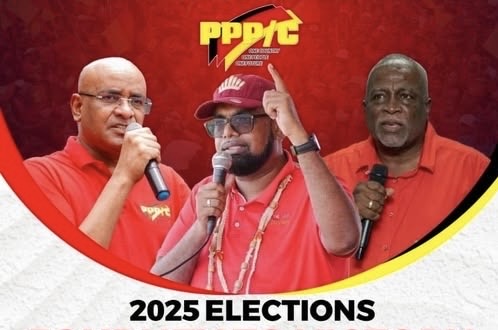Guyana SN newspaper carried a balanced and well written editorial, “Campaign launches” (Jul 18), outlining some campaign promises of the two main parties and the failure of the parties to mention the Venezuelan threat.
Launches and other meetings are extremely important communicative events to capture interest of base. The meanings inscribed in messages at rallies are critical for parties to hold the base and win converts. The launches are known in political studies as patron-clientele events, and on that score, the parties did well to bring out cheering supporters to give them momentum as the campaign continues. The parties will now have to appeal to floating voters with enlightened pragmatic proposals. The editorial justifiably expresses the hope that parties will be more specific and explain in manifesto how it will fund various proposed projects. Some proposals are not practical. The PPP held manifesto engagements with the public.
The contest has begun although has not drawn much national interest as yet because six weeks remain before polling day. People nationally are not much into the campaign although meetings have attracted large crowds.
I had the fortune of observing meetings of the two main parties plus newly formed WIN and as such in an informed position to speak on the truth about the size of crowds. I also note from my studies, experience, and empirical knowledge that crowds and manifestos don’t win elections especially in a racially polarized nation. People still vote race. Indians, in particular, are not revealing evidence of cross racial voting in this election although they did so in 2011 and 2015. This may give the PPP, the party of the Indians, the advantage; regardless what many say or feel, objectively speaking, it is the party to beat. It is ahead. Anyone who disputes that view is not practical in assessing crowds and support for the parties.
It has been some of the most rally-intensive campaign launches in recent elections . The launches and other meetings have been elaborate productions to capture attention. All the launches and subsequent meetings of all the parties were well organized with very large attendance. WIN was quite impressive in its debut ‘meetings’ in presenting its list on nomination day and in its cottage gatherings; it was the most impressive of all new parties over this century. It is noted that among spectators at all meetings of all parties, some come to listen, others to be entertained (great music and singing that draw many) and yet others to be seen by the leadership that they are with the party or movement; lewdness and lascivious behavior, a feature of every campaign of the dominant parties, have not started as yet. Lewdness turned away voters in 2011.
By far, the PPP had the largest gatherings at national meetings as well as cottage meetings. The opposition meetings have been relatively small in contrast with PPP’s. The cottage meeting at Lusignan was one of largest I observed in community meetings among the three parties I saw in Guyana. They were also the largest I observed in travels and observations of meetings throughout the Caribbean. Lusignan and Fouls had cross over attendees unlike seen before; is the party crossing ‘the race rubicon’? The Kitty launch was the biggest I observed for any launch in Guyana by the PPP. The diversity of the crowd stood out. It was the most diverse crowd since 1953 elections. WIN also has had very diverse gatherings. The meaning of the diversity and its impact will have to be explained by analysts. The national meeting at Patentia was the largest there in memory. Except for WIN, the opposition is a skeletal of its turnout at campaign meetings.

It was (and is) expected that PPP would (and will) attract the largest gatherings because it has the most resources and the best organizational machinery in Guyana as well as in the Caribbean. It also has one of the best political strategist in the form of the Vice President and the party’s President nominee is a populist who attracts people of all ethnicities, faiths, and ages. In contrast, several respectable personalities have been abandoning the PNC or APNU. In spite of these setbacks, one must not dismiss the electoral prospect of APNU as it did well in all democratic elections in spite of performance in government and leadership.
Not only in their launches, but at other rallies as well, politicians have been known to make routine, programmatic and clientelist (voters who depend on the party) appeals to supporters to retain them and to win over new ones. Some proposals are not doable or are pie in the sky. These will impress sycophants but not middle of road voters. And party platform speakers generally seek to retain the base and make cross over gains. Flattery has not won over the floating voters.
Editor, thank you for highlighting the fact that the parties did not mention how they will address the Venezuela threat. An oversight maybe! It is the most significant issue for Guyanese. They all think about this threat. Relying on USA, establishing a defense treaty or some kind of linkage with Washington, as being advocated by the GoAMERICA, is a guaranteed wage to protect Guyana against Venezuela. Guyanese, except the communists, want to cement ties with USA. Guyanese expect the Americans to deter aggression and in a worse case scenario to defend the country.
The editorial is an apt focus on the launches and what the campaign should address. It is hoped that the parties will pay heed and respond accordingly so that (floating) unaligned voters can make an informed decision. They await the manifesto.
